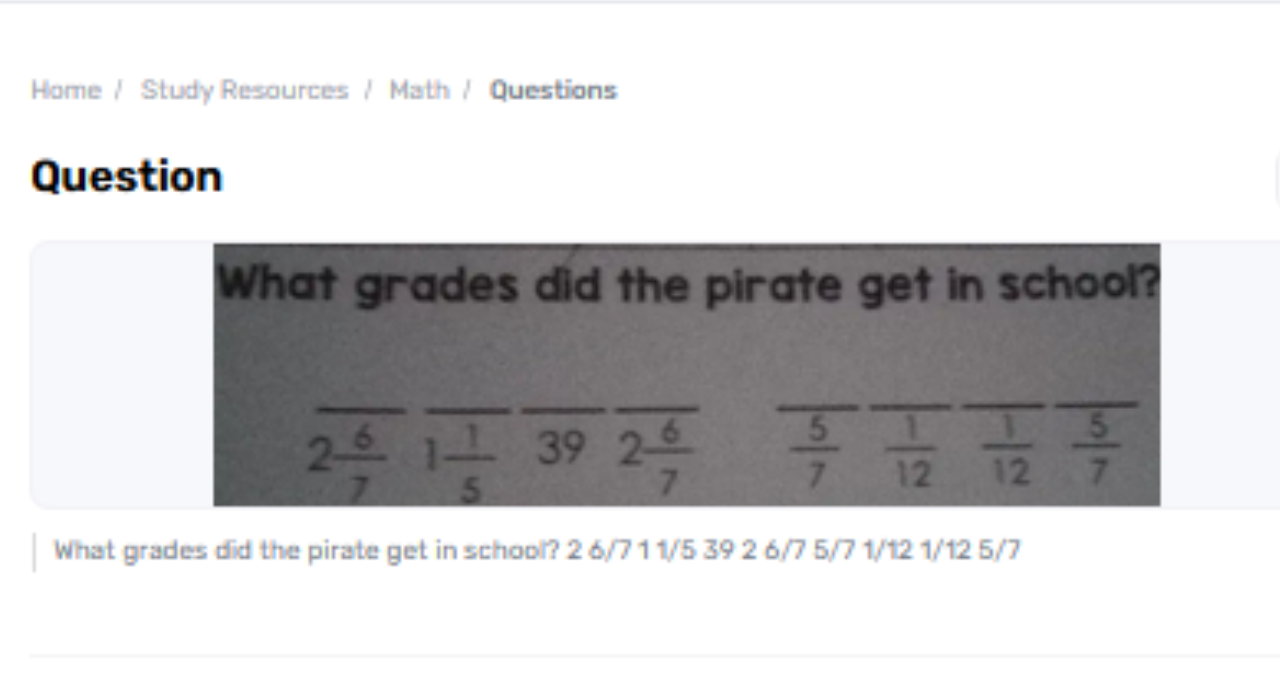The address, what grades did the pirate get in school serves as a perky setup for a classic joke regularly delighted in for its punny bend. This basic address carries with it an amusing suggestion that ties into prevalent generalizations almost privateers. To completely appreciate the joke and the setting in which it is frequently conveyed, it is valuable to investigate the social foundation of privateers, the nature of humor including wit, and the particular punchline of this joke. This paper will dive into these angles, eventually uncovering the reply and its noteworthiness.
Understanding the Joke: The Pirate's Grades
The address, "What grades did the privateer get in school?" leads to a lively punchline that combines instructive and marine subjects. The joke cleverly employments the play on the words "tall C's," playing on the likeness between the sound of "C's" and "oceans," which ties into the cliché pirate's discourse and way of life. This pleasantry improves its funny effect.
The Social Picture of Privateers
Privateers have long been a source of interest and interest in well-known cultures. From the authentic accounts of genuine privateers like Blackbeard and Anne Bonny to the anecdotal portrayals in writing and movies such as "Privateers of the Caribbean," privateers are regularly depicted as defiant, bold, and larger-than-life characters. This social picture is stamped by particular characteristics such as their interesting discourse designs, clothing, and behaviors. The cliché privateer emphasizes, characterized by the delayed "arr" sound, has ended up a trademark of privateer depictions, contributing to the funny portrayal of privateers in-jokes and plays on words.
The Part of Pleasantry in Humor
Pleasantry, counting quips, plays a noteworthy part in humor. Plays on words include misusing different implications of words or similar-sounding words to form a funny impact. They require a level of etymological imagination and the capacity to recognize and appreciate the twofold implications or phonetic likenesses included. The joke approximately the pirate grades in school depends on this sort of wit, utilizing the pirate's particular discourse pattern to create a punchline that's both intelligent and entertaining.
The Setup of the Joke
The address "What grades did the privateer get in school?" sets the arrangement for a punchline that pivots on the listener's nature with privateer generalizations. It prompts the gathering of people to think about the concept of grades in an instructive setting, while at the same time conjuring the picture of a privateer. This juxtaposition creates a sense of expectation and interest around how these irrelevant components will be associated with the punchline.
The Punchline: High Seas (Cs)
The punchline to the joke is: "The privateer got tall C's." This reply plays on the phonetic closeness between "tall oceans," a term related to privateers and their enterprises on the open sea, and "tall C's," alluding to grades of C in school. The humor emerges from the intelligent utilization of the pirate discourse design, where the letter "C" is articulated as "ocean," making a play on words that tie the instructive setting to the privateer topic. This wit not as it were conveys a funny bend but moreover fortifies the social generalization of privateers, making the joke important and engaging.
Fundamental Steps for Utilizing the Gauth Application to Reply Questions
Introduce and Set Up
Download Gauth from the app store and make an account.
Log In
Open the app and log in along with your accreditations.
Inquire an Address
Enter your address, select the fitting category, and yield it.

Conclusion
The joke "What grades did the privateer get in school? High C's!" embodies the utilization of pleasantry and social generalizations to make humor. By understanding the foundation of privateers in well-known culture, the part of quips in humor, and the development of the joke, one can appreciate the cleverness and beguilement it gives. This joke highlights the persevering offer of plays on words and the way they can change basic questions into sources of chuckling, outlining the immortal nature of perky dialect and social references.


